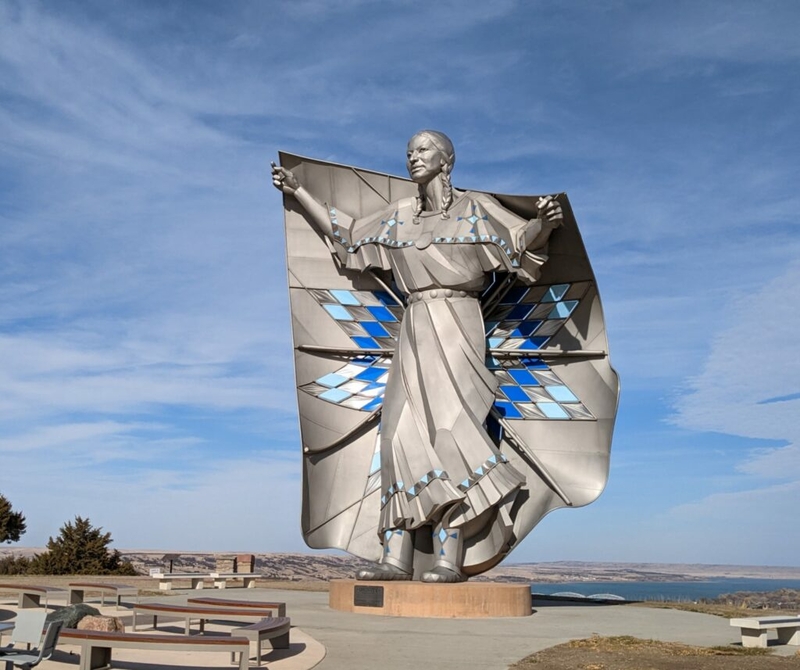Social studies standards a new version of ‘kill the Indian, save the man’

What does it say when, during a time of deep and troubling news on the high number of deaths at the boarding schools used to assimilate D/N/Lakota children, that Gov. Kristi Noem would hire a Christian-school consultant to shape a working committee for new South Dakota social studies standards?
This reads as a violation of church and state, as well as a new brand of “kill the Indian, save the man,” by the State of South Dakota. These new standards have removed many references about the Oceti Sakowin Oyate that former working groups had added. They also push a form of American exceptionalism and Western civilization that is a dog whistle for American white hegemony and supremacy.
Many of us question the SD Department of Education workgroup that made these changes. We must ask if the Oceti Sakowin Oyate was invited to the table to discuss. We must ask if the removal of Oceti Sakowin education was influenced by South Dakota Governor Noem’s statement supporting “honest, patriotic, education that cultivates in our children a profound love for our country.” Noem has also stated that “the state must do a better job educating teachers on civics, that the U.S. has failed to educate generations of children about what makes America unique, and that the left is indoctrinating students.”
It is important that we as the Oceti Sakowin Oyate ask what the governor’s words really mean. It appears that these words may be the influencing factor to the removal of the Oceti Sakowin from social studies curriculum.
In Noem’s statement, “honest, patriotic, education that cultivates in our children a profound love for our country;” we must ask who are “our children”? If “our children” includes the Oceti Sakowin children, then it is of utmost importance to teach Oceti Sakowin curriculum. Furthermore, if one is to speak of “patriotism,” be reminded that many Oceti Sakowin Oyate fought and died in all the wars that the United States entered in. In WWI, the Oceti Sakowin went to fight for the United States when citizenship, ironically, had not yet been granted. It would not be granted until 1924. These United States are our Indigenous homelands, and we have a profound love for I’na Maka (Mother Earth). We ask, has the social studies curriculum ever taught about our shared “honest, patriotic” love for “our” country? The words “our children” must include all children; therefore, including the history of all children.
If Noem is dedicated to doing a “better job educating teachers on civics, that the U.S. has failed to educate generations of children about what makes America unique,” we ask “what about generations of Oceti Sakowin children?” For generations, social studies did not teach about Oceti Sakowin. Finally, after years of advocating, Oceti Sakowin curriculum was given to schools. It was not legislated for all schools to use, but it was progress in bridging the gap between Oceti Sakowin and white South Dakota. Now, with these statements by the governor and the actions taken by the social studies workgroup, there is a dark regression to a time of attempting to eradicate the Oceti Sakowin. We, Oceti Sakowin Oyate have survived horrific times; we are still here, and we will survive this, too.
We must ask why at this time is there this push to eliminate Oceti Sakowin education? The question that must be asked of those who support this: is it fear; and what is it that you fear? Secondly, is it shame? Is the truth of history too much shame to face?
We as Oceti Sakowin Oyate have carried the wounds of our historical trauma. Most recently, Oceti Sakowin youth and children were returned home to Rosebud, South Dakota, from the Carlise Boarding School, Pennsylvania, to be buried in the I’na Maka (Mother Earth) of their homelands. There are more Indigenous children yet to be returned home all across this nation. This bringing home of the Oceti Sakowin children is a step toward our healing.
History cannot be ignored. The attempt to eliminate Oceti Sakowin education from the social studies curriculum will not change or erase history. It is only by all being willing to face the true facts of history can all begin to heal.
In closing, we ask that the social studies workgroup reconsider the actions that have been taken. We also ask that Oceti Sakowin Oyate representative(s) be invited to the table for an open respectful honest dialogue.
Pilamiyaye (Thank you).








